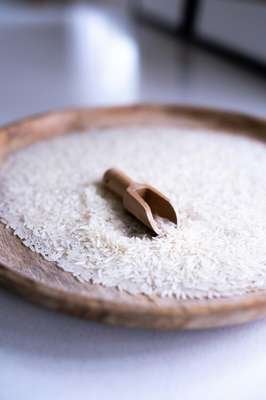Lose Weight Fast? Uncover the Truth Behind the Wildly Viral 'Ricezempic' Slimming Secret!
By
Danielle F.
- Replies 5
Disclaimer: The information provided in this article does not constitute medical advice. Please consult healthcare professionals first before implementing any changes in your diet or health regimen.
In the ever-evolving world of health and wellness, a new trend often emerges, promising quick and effortless results. The latest to capture the attention of the internet is the 'Ricezempic' weight loss hack, a phenomenon that has taken TikTok by storm. But what exactly is 'Ricezempic,' and can it truly deliver on its weight loss promises? Let's dive into the details and separate fact from fiction.
'Ricezempic' is a term coined from the popular injectable weight-loss drug Ozempic, which has gained notoriety through endorsements by high-profile figures like Oprah Winfrey and Elon Musk. Unlike Ozempic, 'Ricezempic' is not a pharmaceutical product but rather a homemade concoction that anyone can prepare using two simple ingredients: rice and water.
The process involves soaking half a cup of uncooked white rice in a cup of warm or hot water overnight. The next day, the rice is strained, leaving behind a starchy liquid that some claim has appetite-suppressing effects. For an added twist, a squeeze of lime or lemon juice can be mixed into the drink for flavor.
The buzz around 'Ricezempic' centers on its supposed ability to make individuals feel fuller for longer periods, thus reducing overall calorie intake and potentially leading to weight loss. Proponents of the trend attribute these effects to the presence of resistant starch in rice, which is known to have several health benefits, including regulating blood sugar levels, improving gut health, and aiding in weight management.
Resistant starch acts as a prebiotic, serving as nourishment for beneficial gut bacteria. However, it's important to note that while resistant starch has its advantages, there is no concrete evidence to suggest that it directly contributes to a sensation of prolonged fullness.
Moreover, the actual amount of resistant starch found in white rice is relatively low, with half a cup of uncooked white rice containing approximately 0.6 grams. Considering that there is no established recommended daily intake for resistant starch in the UK, and the fact that the transfer of resistant starch into the water consumed is uncertain, the effectiveness of 'Ricezempic' as a weight loss solution remains questionable.
As with any health trend, especially those that go viral on social media platforms like TikTok, it's crucial to approach them with a healthy dose of skepticism. While 'Ricezempic' may not be harmful, relying on it as a primary method for weight loss could be misleading and ultimately disappointing.
For our readers at the Seniors Discount Club, particularly those over 60, it's always advisable to consult with a healthcare professional before trying out new health trends. Sustainable weight loss and management typically involve a balanced diet, regular physical activity, and sometimes medical advice, especially for those with underlying health conditions.

In conclusion, while 'Ricezempic' may have piqued the curiosity of many, its efficacy as a weight loss hack is not backed by substantial scientific evidence. It's essential to prioritize well-researched and healthful approaches to weight management. Have any of you given 'Ricezempic' a try, or do you have other weight loss strategies that have worked for you? Share your experiences and thoughts in the comments below – we'd love to hear from you!
In the ever-evolving world of health and wellness, a new trend often emerges, promising quick and effortless results. The latest to capture the attention of the internet is the 'Ricezempic' weight loss hack, a phenomenon that has taken TikTok by storm. But what exactly is 'Ricezempic,' and can it truly deliver on its weight loss promises? Let's dive into the details and separate fact from fiction.
'Ricezempic' is a term coined from the popular injectable weight-loss drug Ozempic, which has gained notoriety through endorsements by high-profile figures like Oprah Winfrey and Elon Musk. Unlike Ozempic, 'Ricezempic' is not a pharmaceutical product but rather a homemade concoction that anyone can prepare using two simple ingredients: rice and water.
The process involves soaking half a cup of uncooked white rice in a cup of warm or hot water overnight. The next day, the rice is strained, leaving behind a starchy liquid that some claim has appetite-suppressing effects. For an added twist, a squeeze of lime or lemon juice can be mixed into the drink for flavor.
The buzz around 'Ricezempic' centers on its supposed ability to make individuals feel fuller for longer periods, thus reducing overall calorie intake and potentially leading to weight loss. Proponents of the trend attribute these effects to the presence of resistant starch in rice, which is known to have several health benefits, including regulating blood sugar levels, improving gut health, and aiding in weight management.
Resistant starch acts as a prebiotic, serving as nourishment for beneficial gut bacteria. However, it's important to note that while resistant starch has its advantages, there is no concrete evidence to suggest that it directly contributes to a sensation of prolonged fullness.
Moreover, the actual amount of resistant starch found in white rice is relatively low, with half a cup of uncooked white rice containing approximately 0.6 grams. Considering that there is no established recommended daily intake for resistant starch in the UK, and the fact that the transfer of resistant starch into the water consumed is uncertain, the effectiveness of 'Ricezempic' as a weight loss solution remains questionable.
As with any health trend, especially those that go viral on social media platforms like TikTok, it's crucial to approach them with a healthy dose of skepticism. While 'Ricezempic' may not be harmful, relying on it as a primary method for weight loss could be misleading and ultimately disappointing.
For our readers at the Seniors Discount Club, particularly those over 60, it's always advisable to consult with a healthcare professional before trying out new health trends. Sustainable weight loss and management typically involve a balanced diet, regular physical activity, and sometimes medical advice, especially for those with underlying health conditions.
Key Takeaways
- 'Ricezempic' is a DIY weight loss hack trending on TikTok, inspired by the drug Ozempic, which is known for its appetite-suppressing qualities.
- The homemade 'Ricezempic' drink is created by soaking uncooked white rice in water, straining it, and consuming the resulting liquid, with some adding lemon or lime juice.
- Proponents of the drink claim it suppresses appetite and contributes to feeling fuller for longer, attributing its effects to the resistant starch found in rice, which has health benefits like regulating blood sugar and improving gut health.
- There is no concrete evidence that 'Ricezempic' leads to prolonged feelings of fullness or that the resistant starch from rice is effectively transferred to the water when soaked, and the amount of resistant starch in uncooked rice is relatively low.








